- June 4Students Respond to the Hit Netflix Series "Adolescence"
- June 4A Friend Cheated on a Test. Should I Tell the Teacher or Keep It a Secret?
- June 4Why Stress About Yourself When You Could Stress About Others?
- May 24Body-Shamed At 4 Years Old, But For One Student, Dance Has Also Been a Refuge
- May 24My friend Asks Me to Share What Was on the Test So He Could Prepare
- May 24Where Art Thou, Romeo? How — and Why — ISB’s English Curriculum Has Changed
- May 23Bangkok vs. The Elements
- May 21Far From Home: Being an International Student at ISB
- May 19An Open Letter to Administrators: Why You're Wrong About School Uniforms
- May 19I Have a "Friend" Who Thinks We're So Close, But I Started Not Liking Them ...






Jerry Nam • Apr 28, 2022 at 7:56 am
You said it is inaccurate and that “there are plenty of other ways” to determine the capabilities of students. How is it inaccurate? The fact that students from higher income families score better, on average, than those from lower income families does not make standardized testing inaccurate. Yes, aptitude tests like SATs and ACTs may not be the best indicator for a student’s success in higher education but by no means it is inaccurate. It seeks to tests students on their skills. What are some other ways “to do it”? How can higher education institutions normalize and standardize different ways each high school evaluates students? Take ISB. In 11th and 12 grade, students are given a weighted GPA out of 7. Some U.S. public schools do not base their curricula on the International Baccalaureate, and thus have a different GPA system. Although your argument is valid to an extent, it lacks important considerations.